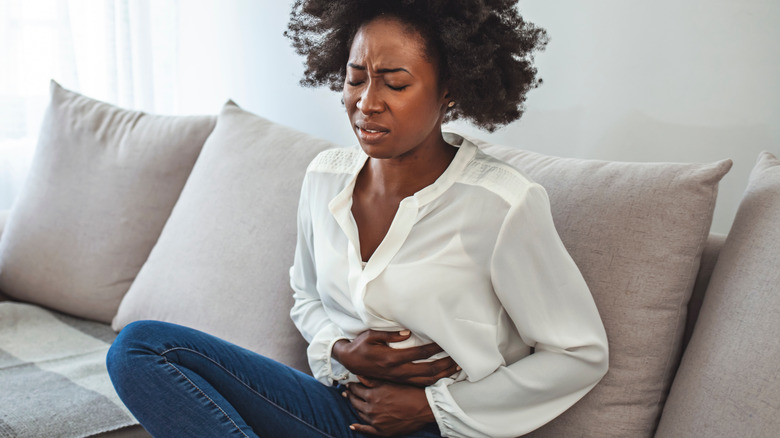What Happens To Your Body When You Have Menstrual Cramps
Ugh. Menstrual cramps are the worst. If they're bad enough, cramps can interfere with your mood, productivity, and plans. According to Healthline, the throbbing, achy pain in your lower belly can range from a mild annoyance to sharp, even debilitating pain. One 2012 study in the Journal of Pain Research says that 84.1% of women report experiencing menstrual cramps, with 43.1% claiming they occur with every period and 41% experiencing cramping with some periods. If you experience them, cramps usually begin a year or two after your first period, but they often become less severe or even stop after having a baby (per WebMD).
But what happens to your body when you have menstrual cramps? Why does menstruation cause cramping, and is there anything you can do to reduce the effects that period pain can have on your life and well-being? Let's look at the physical mechanisms behind menstrual cramps and what you can do to lessen their impact.
What causes menstrual cramps and how to relieve them
Menstrual cramps are also called dysmenorrhea. Healthline describes the most common period cramps as primary dysmenorrhea. This type of cramping is a normal side effect when the body discharges the uterine lining each month you don't become pregnant. Hormone-like fatty chemicals called prostaglandins cause the uterus to contract, which squeezes the old blood and uterine lining out through the vaginal birth canal. The uterine lining contains these prostaglandins, which are released into the body as the lining is shed. Prostaglandins control many processes, including blood flow, inflammation, and labor (per You and Your Hormones).
Prostaglandins are flushed out along with menstrual blood, and after a few days, the amount of prostaglandins in the uterus is reduced, and cramping subsides (via Healthline). Abnormal or severe cramping, on the other hand, may be caused by reproductive disorders like endometriosis or uterine fibroids. The Mayo Clinic says these cramps can be treated with birth control or even surgery.
For regular menstrual cramps, WebMD recommends taking an over-the-counter pain reliever like aspirin, acetaminophen, naproxen, or ibuprofen. Heat can also help relieve the pain, so resting with a heating pad or hot water bottle can help, and a warm bath with Epsom salt can help lessen aches and pains. According to a study in The Journal of Alternative and Complementary Medicine, yoga can help relieve cramps in people with endometriosis. And Medical News Today says CBD can possibly help with menstrual cramps without psychoactive effects.


